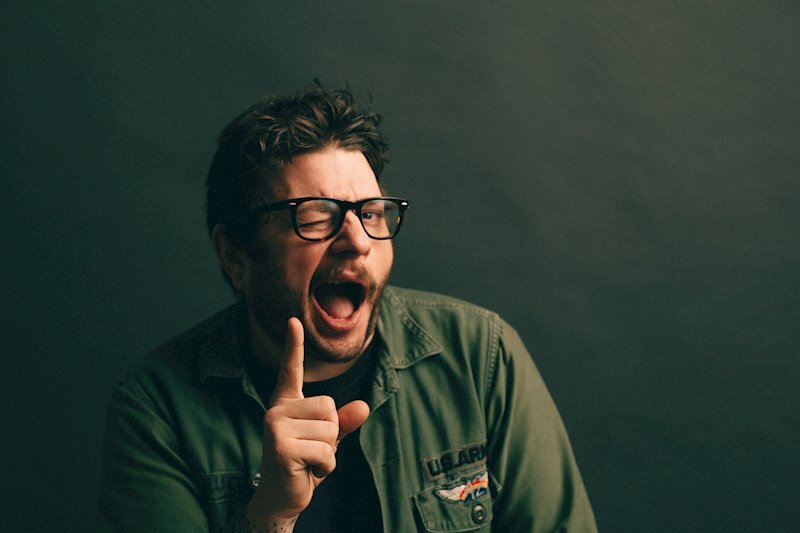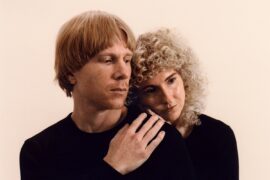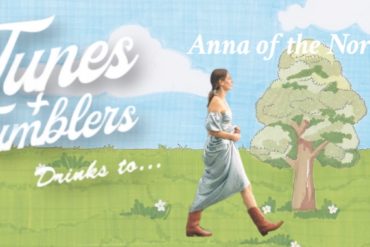The Homeless Gospel Choir turn the volume up on their newest punk anthems with their first full-band album, ‘This Land Is Your Landfill.’
“Young and in Love” – The Homeless Gospel Choir
One person hardly constitutes as a choir. Despite performing under the name The Homeless Gospel Choir for years, the project really consisted solely of Derek Zanetti. Still, there has always been something communal about his music. Songs like “Musical Preference” or “Normal” had themes of finding common ground and being together, which united audiences around THGC. Now with their sound rounded out by a fully-operational, loud punk band, Zanetti reaffirms that feeling of togetherness on the latest Homeless Gospel Choir This Land is Your Landfill (Available Friday, April 24, via A-F Records).

Adding Matt Miller, Maura Weaver, Megan Schroer, and Craig Luckman to the band, The Homeless Gospel Choir have a newfound intensity and an entirely fresh sound from the band’s folk punk roots. These are songs that you can mosh to and scream your political and personal frustrations out with the self-affirming “Don’t Compare” or the guest vocals chiming in to close out “Young and in Love.”
Zanetti has mastered a type of political punk that gives the finger to authoritarian mechanisms of oppression, but knows sometimes the most powerful weapon is to call out when the emperors are wearing no clothes, and the naked rulers are funny. “You Never Know” and “Global Warming” have searing messages, exposing hypocrisy and atrocities, but Zanetti’s lyrics show that sometimes making fun of the people committing those actions can be the most effective.
Atwood Magazine spoke to Zanetti about self-isolation live-streams, writing and performing with a full band, and writing very specific punk rock.
— —
:: stream/purchase This Land Is Your Landfill here ::

A CONVERSATION WITH THE HOMELESS GOSPEL CHOIR
Atwood Magazine: Where are you holed up during all this?
I’m in my home in Pittsburgh, Pennsylvania. I have a little in-home art studio and recording studio that I have just set up here in my house, and I’ve got a million things on my plate to keep me busy. As much as I want to be out on tour this very minute, this might be a good message from the universe to tell me to personally slow down and that I don’t have to always be going all the time. At least that’s the lesson I’m trying to take from it anyway.
Definitely. I totally get that. I get FOMO all the time, and I feel like all this going on has made me realize, “Okay, I’m not missing out on any more than anyone else is missing out on.”
Nope, and time’s not gonna go on without you. Everybody else is held up too. Me and my partner went up to the high street, where all the businesses are up the street from us and no one’s out. There was nobody anywhere. Saturday at 6:30, usually the street’s bustling. There’s like three ramen bars on that street and crazy restaurants and coffee shops and bars. It was just an absolute ghost town. It was very odd.
I’ve been tuning into some of your livestreams. I’ve noticed some you’re playing music like one you did with Mikey Erg. They’re not always you playing sometimes-they’re just sort of check-ins. Why have you been going live every day?
I’m just getting a bunch of messages and emails. People are asking my opinion on what they should do. “Hey, we’re bummed out the tour’s cancelled!” [or] “Hey is the record still coming out?” Things like that. I’ve just gotten on there and addressed some of those questions publicly and in a way that addresses some more broad questions. I think people are eager to have this type of expression-a communal expression.
Certainly, it’s not the same as going to a punk show. On the live show, in many cases, we’re fortunate enough to have a couple hundred people show up and it’s the same people who show up every time, and everyone’s talking amongst each other, and there’s inside jokes. They requested this song “Sugar Toe,” which isn’t even a real song. I wrote a song about getting pre-diabetes, and I played it one time when I was in the U.K. because I was super super stoned. They just liked the song so they always request me to play “Sugar Toe.” It’s like hanging out with your friends in a high school hallway, but you’re in your own house and kind of bored to death.

I also think it’s good to hear reassuring messages from people whose work you admire. I saw on the one you did today you said something along the lines of, “I’m working, but if you want to take this as a mental break. It’s good to chill out.”
I was really inspired by Sean [Bonnette] from AJJ. He was doing a live streamed show every night at around the same time. He gets on and he does a live cast every night, where he answers some questions, and he takes some requests. I can’t describe it other than: it’s like hanging out at your friend’s house in the basement, smoking cigarettes, having a shitty beer. You’re hanging out, and your friend is playing songs on a little stool. You know everyone else that’s in the chat. It’s a thing to look forward to in the midst of uncertainty: 7:00 every night, Seans’ gonna do a live stream and we’re gonna hear the songs that we like, and he’s going to let us know everything’s gonna be okay.
This is the first full-band Homeless Gospel Choir record. Why did you want to bring a full band along for this one?
We recorded it similarly to the way we recorded the last ones. I’ve been doing the acoustic thing for ten years, and I came to a place where all the things that I wanted to do, I just don’t wanna do by myself anymore. It’s great to play shows and be on tour, but sometimes when you’re just there by yourself, it tends to be lonesome. I thought it would be great to share these songs and to share this new expression and share the new songs I was writing that were designed to be played as a full band to just be a full band.
And the old songs that I wrote, just acoustic solo songs to be re-phrased and reframed as a full band song has turned out to be fucking super sick. I think people like them more to be honest. I just wanted them to be loud. I was hearing lots of loud, noisy, confusing, lots of feedback, loud, pounding drums, and I don’t think I could’ve been honest to those feelings and those thoughts if I’d just made an acoustic record.
How does having a full band change the music live, especially the old songs?
It’s the fucking coolest thing you’ve ever seen in your life. They’re so good. They’re such a good band. They hold everything together for me so I can just let my guitar feedback and scream my head off, and it sounds fucking super sick. I really lucked out with having the best band, truthfully. I think it’s super sick.
One of the things I think you do really well is writing political songs, and I don’t know if you still do it, but you introduced every song by saying, “This is a protest song.” You combine all those political things with elements of your personal life. What’s your writing process like for that? Do you decide to write about an issue and then find ways to weave it into your personal life or start writing about something personal and realize that it connects to bigger themes?
For the last two records that I did, Normal and This Land is Your Landfill, I’ve taken more of a framed approach. If you set up what the picture frame is, everything has to fit within the confines of a picture frame. I wanted the record to be conceptual in many ways.
I was on tour with my friend Frank Iero from My Chemical Romance, and I asked him about his record The Black Parade, because it’s a concept record. He was like, “When we went to go make this record, we had the idea of the record before we started writing it. So, we knew we were writing for a story that we had to fill the gaps into.” I wanted to take that approach as well.
I tried to embody different ways to write songs. I got into the Song Exploder podcast for a while, which different artists go into great detail for their different songwriting processes. I tried to adapt some different songwriting processes. It’s the first time that I ever-with Matt Miller and I, who plays guitar in The Homeless Gospel Choir-we sat down and crafted these songs together. That was the first time I ever worked in that way as well.

A few times you make overt political references, like at the start of “Global Warming,” do you worry that if we have a new president in November or four years from now we have someone else that having an overt Donald Trump reference will make the song sound dated?
I think it’s important that whenever we make art and whenever we make music, it’s a snapshot of our lives that we’re currently living in. In our life right now in this particular moment, this is what the snapshot happens to look like. We have an absolute maniacal, super-evil-villain president who thinks that global warming was a hoax that was created by the Chinese. I thought of a million clever ways to try to make fun of him in this record, and I was like, “He’s doing it himself. I’m just gonna quote him, saying himself and that will be irony of it.”
Also, I’m a big fan of protest music. If you look at protest singers like Bob Dylan or Neil Young, they’re very specific about the thing that they’re writing about. Bob Dylan is writing about Richard Nixon and the presidency and the things that’s happening right then. Neil Young’s writing about the shooting in Ohio with the protesters-very specific with timed details. I just think if you’re going to write something that’s a snapshot of where you happen to be currently, and This Land is Your Landfill is a record that was written in 2019 and came out in 2020. This is the current vibe and feel of what the snapshot looks like at this moment.
I don’t want to use the word dated, but maybe like a landmark to say, “When this was happening, how did Derek feel? This is exactly how he felt.”
It’s funny too, being a punk fan growing up. Listening to older songs, I’d be in fifth grade, pissed off about the Reagan administration in 2005.
Yeah, the Dead Kennedys did a great example of that. Other political bands at that time spoke directly to power by name and would talk shit. How many awesome 80’s hardcore flyers are there with Ronald Reagan’s face on the poster? I think that’s so fucking sick.
A lot of the time you have jokes and there’s a nod and wink with your lyrics. Do you think that by being humorous it makes the songs a little more sincere?
I think whenever you talk about some of these big issues, and you just pound people over the head with information and how terrible the world is, I think that can grow to be nauseating, and I think that can grow to be just static in the background. “Oh cool, there’s nothing that’s thought-provoking here, or you’re not making it personalized at all.”
I think by the wink and the nod and the “hey, we’re all in this together. Yes this is shitty, but you’re not alone.” Or, “Hey, this is a shitty situation, and we can and should make fun of it, cause cops suck,” it gives everybody else permission to make a wink and a nod at it too.
One of the songs I think you did that really well on that has probably one of my favorite lyrics on the album is “You Never Know.” Can you tell me more about writing and recording that song?
In the very beginning, I just had one line that I wanted to repeat over and over again and add instrumentation to it. As Matt and I were ironing out that song and making it what it is, we were thinking about different parts of our bodies: my eyes, my heart, my mind, and my feet-different parts of my body that wear out as I get older. It’s a super political song, because it talks about how the weight of all this is taking a toll on my physical body, which is true in metaphor and true in practicality, which I think is kind of funny.
One thing that’s super cool about this song: we had Rich Steff from the band Lucero, which we were super fucking stoked to have him do a feature on our album.
Speaking of guests, another one that I really liked was “Young and In Love,” but who was it doing guest vocals at the end of that track?
There’s four of us that do it: It starts off with Chris #2 from Anti-Flag, then Matt Miller is the second one, and the third is [Homeless Gospel Choir bassist] Megan Schroer, and I’m the one who finishes it out on that song. [Megan] plays in the band Boys from Cincinnati, which is a seminal pop-punk band. If Green Day wrote catchier songs and had a fem-fronted singer, that’s what it reminds me of.
How did you decide to let other people take the lead toward the end of that song?
I think I wanted it to be more of a plurality of “We’re in a band now.” This record is a band record, and we’re doing this together as a band of people, and we’re making this record as a band of people, and we’re gonna show the record as a band of people, and I wanted to emphasize that on this album, especially in the way we’re showing it and promoting it. Even though I’m on the cover and on a surf board, the full band photos that we’re trying to show with the promotion and stuff, I want everybody to know that this is a full band record, and there’s nothing folk-punk about it. It’s a loud punk record and a full band record, and I was really trying to emphasize that and drill that home.

One more song that I wanted to ask about is “Don’t Compare.” Can you tell me a little bit more about writing and recording that?
I think I was so bothered by how easily manipulated I and my friends were by other people’s opinions of them on the internet. And we’re living in this comparison culture, and it’s really stifling and in many ways crushing our ways to relate to each other on a personal level and on an intimate, friendship level like, “My friend James Crowley and I went out and we had this experience and we’re friends and that’s valuable,” but I think with comparison culture, it changes from us being equals and experiencing something to comparing yourself to what everybody has on the internet. I found it to be captivating and something that people were so easily getting sucked into it. It was off-putting and something that was on the forefront of my mind.
Do you think in getting all those feelings out there, it helps you keep those things in perspective so you’re not affected by things you see on the internet?
Sure, there’s a part of the song that says:
And then you go forgetting all the things that made you special
And you’ll entertain the notion that you should have turned out normal
So, the people in your office won’t think you’re such a fuck up
Even though you feel much better than you ever can remember
And yet you’re haunted by that memory as being seen by somebody
Who knew the kid you used to be, when you were still in high school
You hide behind a coat-rack in a café
during summer and pretend to be invisible
Just like the Holy Spirit
It’s about seeing people in real life that you’ve been comparing yourself to on the internet for so long that whenever you do see them in real life, there’s this really shitty feeling that you have that you’re hiding behind, because you’ll never be as good as the image you put out onto the internet as well. I wanted to try and encapsulate my actual experience in my own life and also try and make that be a more reachable narrative that people will be like, “Oh I relate to that.” Does that make sense?
I think so. Being a person in comedy, you see everyone presenting over the internet and then when you sit down with them, you realize it’s not exactly what it seems. Even if you think someone’s doing better than you, it kind of goes back to the FOMO thing from before: everyone is thinking about all this stuff and it’s difficult.
When I was writing that song, we were listening to the Pixies a whole bunch, and we were listening to the Max Levine Ensemble. We were listening to Bananas. Have you ever listened to the band Bananas?
I have not!
They’re a great band! I was listening to mostly the Pixies. If there would be a takeaway, a ton of the Pixies and Frank Black and really fast and spastic punk rock chords and fast drumming. I wanted to try and make something that was like that.
One of the things that “Don’t Compare” and “Social Real Estate” have are big religious references, which I’m not sure you’ve written about before.
Religion seems to-it’s in every song, even if it’s hidden or if it’s a metaphor for something else. When I was a kid, I was raised in a super conservative, evangelical, right-wing church, like a culty type of a church. That is a huge piece of my story-writing, and my experience.
Now that you’ve mentioned it, I do remember some passing references like in “Musical Preference,” where you say, “When I die and get to heaven.” I didn’t think of that as a religious reference in the moment, but that’s a thing that’s engrained, because I went to Catholic school growing up so I have all this religious stuff that it’s kind of all I can think about.
Right? It’s weird. I think religion is super strange. Especially our wester Christian/Catholic way of doing it, getting kids in there really really early at a very young age and making them afraid of the devil and hell and sin and repetenace and confession and all these other things. It’s really a traumatic experience as a young person to hear about Hell and sin and the devil, and being forced to be like, “Well, if you don’t want to burn in Hell for all of eternity and you ever want to see your parents again, you gotta say this prayer and live this way.” It’s very disruptive to feeling normal as a child.
I was lucky with my Catholic school, because they held off until like sixth grade to instill the real fear of Hell in us, but that was also around the time that I started listening to heavy metal. So I was like, “Well, Iron Maiden also sings about the devil.”
My church was super crazy. There were people speaking in tongues and rolling around on the floor-super crazy, wild Appalachian-all that kind of stuff. Hell is the first thing they start talking about. The second you’re there, they tell you you’re a sinner and they tell you you’re no good, and they tell you that you’ll never be any good, and the only thing about you that’s any good is the fact that you have Jesus inside your heart, and if you don’t have Jesus inside your heart, you’re fucked. Well, they don’t say that, but pretty much they do, from a very young age.
All that religious imagery is in there, and there’s no shaking it out. It’s a perfect metaphor for just about everything, and a lot of my favorite songwriters use religious imagery-Tom Waits, Nick Cave, there’s a lot of really heavy, layered religious imagery in their music, and I probably take from that too.
Completely unrelated: can you tell me about the “Art Punk” music video?
I had an afternoon in Harrisburg, Pennsylvania, which is where Craig [Luckman, Homeless Gospel Choir drummer] and Matt live, and we went around Harrisburg for the afternoon, and I just sang “Art Punk” into the camera about 150 times. We wanted to see if we could shoot a music video and edit the music video and have it turned around in a very short period of time. We used the resources we had with my friend’s camera and some material and some really basic editing software, and we together as friends-Zack Moser, Matt Miller, and Craig Stefanick and I-made this music video together. We made it just with the knowledge and information and resources we had at our disposal.
— —
:: stream/purchase This Land Is Your Landfill here ::
— — — —

Connect to The Homeless Gospel Choir on
Facebook, Twitter, Instagram
Discover new music on Atwood Magazine
? © Martyna Wisniewska
:: Stream The Homeless Gospel Choir ::







